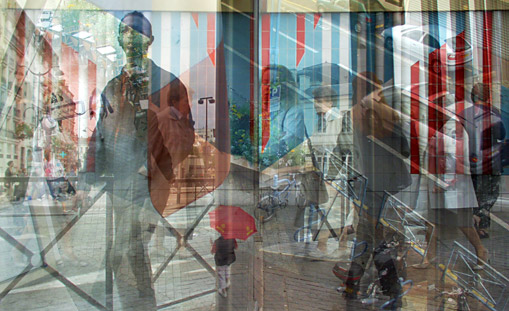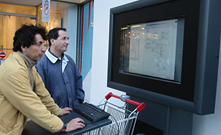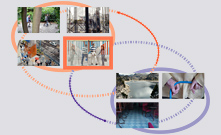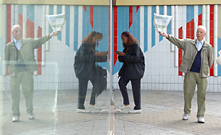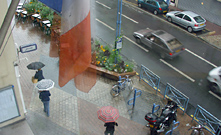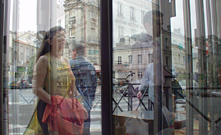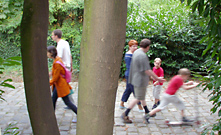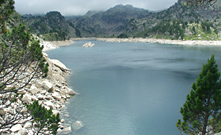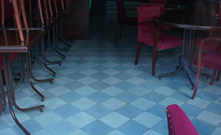|
|
 |
 |
The Cube is a centre for digital arts that
is located in the suburb of Issy-les-Moulineaux, on Paris's south-western
city limit. Issy - and its mayor, André Santini - lay the claim for
being France's first "cybercity". As a municipality, it has incorporated
many of its administrative functions on its web site. It is allegedly the
first commune to have performed an online marriage.
The Cube offers a diversified programme of conferences, exhibitions, and
training, as well as studio space where people can work on projects. However
its activities go beyond this, as it offers artists residencies that allow
them to research different themes. The Cube was created by the ART3000 association,
run by Nils and Florent Aziosmanoff and Stéphanie Fraysse-Ripert. Active
in the digital art field in France for over a decade, ART3000 has organised
a series of conferences on the subjet.
The Cube is housed on several floors of a beautiful, modern concrete building,
with an airy interior and outside platforms that give the impression of an
aerial boat floating above the surrounding neighbourhood.
In 2002 the Cube invited me to make an installation for the 1er Contact
Festival which was to be held from the 16th to the 20th October. The purpose
of the festival was to place digital art works in an exterior, urban setting,
in specially designed street furniture.
I thus worked on Collido_scope throughout the summer, making several trips
to Issy to impregnate myself with the city and its psychogeographical way
of being. I decided to concentrate my project on the town centre, the immediate
surroundings of the city hall, in the vicinity of which the exhibition was
to take place. Thus the work would be exhibited in its place of creation.
I spent a long weekend in August taking hundreds of photographs, rushing down
to the Cube at regular intervals to empty my memory cards.
A motif present in Collido_scope - and which gives it its title - is a
ceramic tiled wall fresco, sharply geometrical, in the style of the sixites
or seventies when it was probably made. I used this as a backdrop for the
principle scene, the image split into two reflecting halves by the glass facade
of the Monoprix supermarket, to which the fresco is perpendicular. I thus
caught people going in and out of the entrance, along with the counterpoint
of their reflections. Mixing up the images in a random, continuous fade would
generate the kaleidoscope effect.
In order to take these pictures, I placed my tripod in an unused entrance
way, with my camera flush with the surface of the glass. At one point a dapper
man exited from the supermarket and challenged me for proof of permission
to take photographs "on his property". I started to tell him that
in terms of urban space I was on the pavement, in the public realm, but thought
it more diplomatic to tell him about the festival. Tell a shopkeeper that
the mayor is involved, and submission follows. Satisfied, he returned inside.
Indeed, the location finally chosen for the installation was to be just
there, the screen placed in front of the ceramic wall. My work was to be placed
in a "sucker" shaped piece of street furniture - in French called
a "sucette", the type that normally contains advertising - but in
this case containing a 42 inch plasma screen, a microphone, and a powerful
computer.
After that I had to process the pictures through Photoshop and do the programming.
At the same time, it was business as usual at Magelis, and I was also working
on the Over My Dead Body project. I returned to the Cube a week before the
festival to work there in residence. Working day and night, on occasion dropping
off on the keyboard at the hotel. At the Cube I shared rooms with a colleague
programming three Sony Aibo dogs to act out Little Red Ridinghood for one
of the other works, a behavioural piece by Florent Aziosmanoff, the Cube's
art director and curator of the festival.
One morning, a few days before the start, the festival producer rushed
in to say that workmen were demolishing the fresco! She managed to stop them,
leaving the wall defaced. The supermarket manager, who was doing serious renovation,
had decided to demolish it in order to put up a sign giving directions to
his parking lot. Unfortunately, it turned out that the wall belongs to the
building next door... so when I suggested that we could save the situation
by removing certain tiles to make the demolition look "aesthetic",
I was informed that this would not be possible, as the wall now constituted
evidence for pending legal action. Finally it was partially hidden with white
board, and the link between the picture and its surroundings, via the fresco,
lost its evident nature. Which demonstrates that one of the aspects of urban
art should be to take into account its unpredictable, changeable nature. C'est
la vie.
After a night of coffee and Aibo barking, Collido_scope was installed in
its "sucker" on the morning the festival started. I had to continue
programming on site with Roland Cahen from the Ircam to get the sound capture
interface running properly, using the keyboard balanced on a supermarket
trolly in the drizzle. The festival consisted of ten installations, very varied
(see the 1er Contact website). Regrettably it lasted for only five days, as the cost for guarding the installations, hiring material,
etc., was very high. But the whole town centre was transfigured, functioning
like an open air museum, people going from piece to piece with their catalogues,
very studiously. It was amazing fun.
Apparently a magician came round to Collido_scope on the Saturday afternoon,
and got all the other people there at that time clapping in unision, and it
worked really nicely.
Collido_scope was presented a second time at the Cube, in March 2003, for
the annual French Internet Festival. This was an occasion to refine the sound
interface, and develop the scenes' dynamics. In February 2004 it was exhibited
in Toulouse in the Traverse Video festival. This provided an opportunity to
develop the “dreaming” aspects of the installation.
Credits
design, photography, programming:
Joseph Rabie
sound interface programming:
Roland Cahen, with the Ircam (Centre Pompidou) Jmax environment.
Photoshop image processing:
Lysiane Beaumel
thanks:
Sylvie Rabie, Florent Aziosmanoff, Clarisse Bardiou, Nils Aziosmanoff, Stéphanie Fraysse-Ripert and the Cube team, the Magelis team.
|
 |






